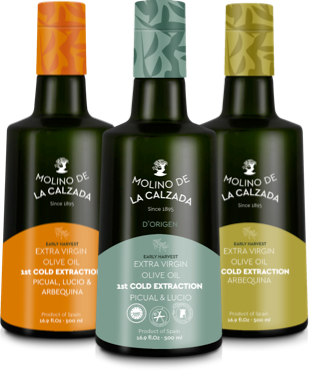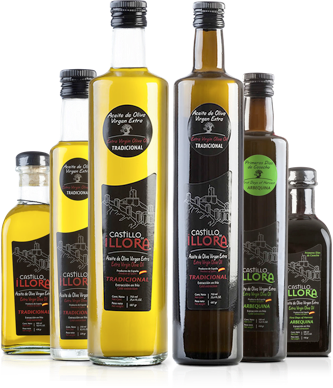Oil Varieties
Our oil meets the highest quality standards. All our varieties are produced in a 100% natural process using cold-press extraction of local oilves.
We offer two categories, depending on our customers' personal preference and use:
- Molino de la Calzada: “early harvest” Extra Virgin Oil for refined palates.
- Castillo de Illora: Virgin and Extra Virgin Oil for dressing or cooking.
Molino de la Calzada
COLD-PRESSED EARLY HARVEST, EXTRA VIRGIN OIL.
Molino de la Calzada is our early harvest extra virgin oil. It has an exceptional flavour and scent, which are characteristic of our olive selections and our strict production process. This variety is named after the old stone press used to produce our first oil back in 1895.
Molino de la calzada varieties are specifically created to enjoy the complexity in our scents and flavours. Early harvest takes place mainly in October and November, when the onset of ripening takes place and olives change from their original green colour to a darker hue.
Recent scientific research has proven that this is the exact moment when produced oil reaches the maximum concentration of polyphenols, a natural antioxidant, responsible for most of the health benefits of extra virgin oil.
Molino de la Calzada varieties have a bright green hue, due to the high amount of chlorophyll, an acidity 0,1-0,1, and a distinct falvour which makes it ideal for uncooked consumption.
Castillo de Illora
100% NATURAL VIRGIN AND EXTRA VIRGIN OLIVE OIL, PRIMARILY PRODUCED WITH PICUAL, LUCIO AND HOJIBLANCA VARIETIES
The Illora Castle (Castillo de Illora) is a regional landmark which gives its name to our traditional olive oil. It has a strong fruity flavour of green olives, with hints of fig tree and green wood and sharp notes. Bitter and sharp notes are well defined and it leaves a long-lasting aftertaste. In this oil, the body and character of the Picual olives are attenuated by the addition of the Lucio variety.
It is produced following the high standard of all our oils, filtered to preserve all its organoleptic properties and its acidity nears 0,3 (extra virgin oil) and 0,5 (virgin oil).
It can be used uncooked, in salads or toast and also cooked, to enhance the flavour of grilled meat or fish.
Benefits and Properties
Extra Virgin Olive Oil (EVOO) is the most natural and healthiest oil, which makes it a basic element in the Mediterranean diet. Our EVOO is pure healthy olive juice, 100% natural, with no aditives or preservatives and filtered to prevent premature decline of its characteristics.
COOKING
At the time of cooking, the best oil that can be used is the EVOO, and depending on the use we will use one variety or another. If we are going to use it as a dressing, the ideal would be the Arbequina or the coupage of Picual, Lucio and Arbequina, for its excellent organoleptic qualities. To fry or cook, Picual and Lucio is better, because it resists better the high temperatures and we can use it a greater number of times than the rest.
HEALTH
Olive oil is the healthiest fat. It has multiple health benefits, such as:
- Decreases cholesterol levels.
- Has anticarcinogenic properties.
- Improves stomach, pancreas and hepato-biliary function.
- Protects against ulcers and gastritis.
- Decreases heartburn
- Decreases general cardiovascular risk.
- Lowers blood pressure, decreases risk of heart attack and arterial thrombosis.
- Regulates intestinal transit and improves nutrient absortion.
- Prevents senile brain degeneration.
- Prevents some degenerative diseases, such as Alzheimer's.
- Prevents tissue and organ aging.
- Moisturize skin and increases its elasticity.
Due to its high content in oleic acid (monounsaturated) and low content in linoleic and linolenic acids (polyunsaturated), EVOO decreases the levels of low-density cholesterol (LDL cholesterol) or “bad cholesterol” and increases high-density cholesterol (HDL cholesterol) or “good cholesterol”. In addition, its high content in tocopherol (vitamin E), polyphenols, flavonoids and squalene give EVOO excellent antioxidant and anticarcinogenic properties. Different studies by Granada and Malaga Universities have shown this to be particularly importan in breast cancer prevention.

